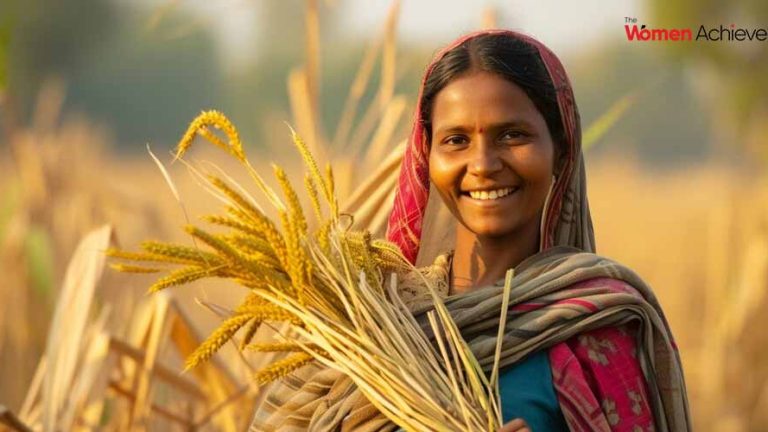Women constitute a substantial portion of India’s agricultural workforce
In India, women have long been the backbone of the agricultural sector, contributing significantly to the nation’s food security and rural economy. Despite facing numerous challenges, including limited access to resources, societal norms, and climate change, many women farmers have demonstrated remarkable resilience and achieved notable success.
The Role of Women in Indian Agriculture
Women constitute a substantial portion of India’s agricultural workforce. According to the United Nations, the agriculture sector employs 80% of all economically active women in India; they comprise 33% of the agricultural labor force and 48% of self-employed farmers. Yet, women own less than 15% of landholdings.
Challenges Faced by Women Farmers
Despite their significant contributions, women farmers encounter several obstacles:
- Limited Land Ownership: Cultural norms and legal constraints often prevent women from owning land, restricting their decision-making power and access to credit.
- Access to Resources: Women frequently have less access to quality seeds, fertilizers, training, and technology compared to their male counterparts.
- Societal Norms: Traditional gender roles can limit women’s participation in agricultural training and decision-making processes.
- Climate Change: Environmental challenges disproportionately affect women, who may have fewer resources to adapt to changing conditions.
Stories of Success and Resilience
Despite these challenges, numerous women farmers have emerged as pioneers, transforming their lives and communities through innovative agricultural practices.
1. Bina Devi – The ‘Mushroom Mahila’
Bina Devi, hailing from Munger, Bihar, earned the nickname ‘Mushroom Mahila’ for popularizing mushroom cultivation among rural women. Starting with minimal resources, she cultivated mushrooms under her bed, eventually training over 1,500 women in five blocks and 105 neighboring villages. Her efforts have empowered women to achieve financial independence and gain respect in their communities. In recognition of her contributions, Bina Devi was awarded the Nari Shakti Puraskar in 2020.
2. The Millet Network of India
The Millet Network of India, initiated by a group of women, supports millet farmers by promoting sustainable agricultural practices. Millet, a traditional crop requiring less water and organic fertilizers, offers a viable alternative to water-intensive crops like rice. The network has been instrumental in advocating for policy changes to include millet in subsidized food programs, thereby enhancing food security and empowering women farmers.
3. Basanti – Transforming Apple Cultivation in Uttarakhand
Basanti, from the mountainous terrains of Uttarakhand, transformed her livelihood through modern farming techniques introduced by Project Unnati Apple. By adopting drip irrigation and organic practices, she significantly improved her apple yields, increasing her income from Rs. 20,000 per season to an expected Rs. 3 lakhs. Her success has inspired plans to build a homestay on her farm, further enhancing her family’s financial stability.
4. Women Farmers in Maharashtra – Climate Resilience
In Maharashtra, women farmers have adopted climate-resilient farming models to combat the adverse effects of drought. By implementing sustainable practices, they have improved soil health and increased biodiversity, enabling them to bounce back after environmental challenges. These efforts have not only enhanced their livelihoods but also contributed to the overall resilience of their communities.
5. Kisan Chachi – The Agricultural Revolutionary
Rajkumari Devi, popularly known as ‘Kisan Chachi,’ from Bihar, revolutionized farming in her village by introducing innovative agricultural practices. She has helped over 300 women achieve financial independence by setting up Self-Help Groups and providing farming expertise. Her story is a testament to the transformative power of diversification in agriculture and the empowerment of women farmers.
Empowerment Initiatives and Policy Support
Recognizing the pivotal role of women in agriculture, various initiatives have been launched to empower them:
- Training Programs: Organizations like the Self Employed Women’s Association (SEWA) provide training to women farmers, enhancing their skills in sustainable agricultural practices.
- Access to Resources: Efforts are being made to improve women’s access to quality seeds, fertilizers, and technology, enabling them to enhance productivity.
- Policy Advocacy: Campaigns to amend policies, such as including millet in subsidized food programs, aim to support women farmers and promote sustainable agriculture.
The Road Ahead
While significant progress has been made, continuous efforts are essential to address the challenges faced by women farmers in India:
- Land Ownership: Reforming land ownership laws to ensure women have equal rights can empower them economically and socially.
- Education and Training: Providing education and training tailored to women’s needs can enhance their agricultural productivity and decision-making capabilities.
- Financial Inclusion: Ensuring women have access to credit and financial services can enable them to invest in better farming practices and technologies.
- Climate Adaptation: Supporting women in adopting climate-resilient farming practices is crucial in mitigating the impacts of climate change on agriculture.
The stories of these resilient women farmers highlight the transformative potential of empowering women in agriculture. By addressing the challenges they face and supporting their endeavors, India can pave the way for a more inclusive and sustainable agricultural future.






Add comment